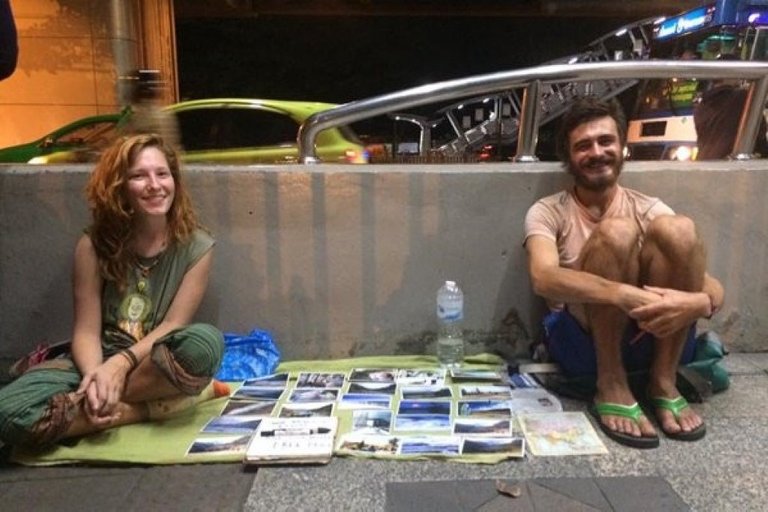(html comment removed: wp:paragraph )
Original:
Who are the 'begpackers' attracting attention across Asia and how do authorities respond?
(html comment removed: wp:paragraph )
Every individual in the media headlights presents an opportunity and a threat to the State. An opportunity to re-enforce it's propaganda among it's own population and a threat in that some aspect of the individual's existence may go counter to the official narratives.
(html comment removed: /wp:paragraph )(html comment removed: wp:paragraph )
(html comment removed: /wp:paragraph )(html comment removed: wp:image {"id":1030,"sizeSlug":"large","linkDestination":"media","className":"is-style-default"} )
 (html comment removed: /wp:image )
(html comment removed: /wp:image )
(html comment removed: wp:paragraph )
'Begpackers' are ordinary people who are doing something the State doesn't like. They are living in a relatively independent fashion. In each containerized State the people within it may have been programmed to believe that their State is somehow special. That being subjugated and extorted from has a particular character and local flavor accompanied by values that aren't held elsewhere. It's true that diverse cultural psychological coping mechanisms do exist, but the underlying reality behind all the diversity is remarkably consistent. Few societies are extortion free.
(html comment removed: /wp:paragraph )(html comment removed: wp:image {"id":1031,"sizeSlug":"large","linkDestination":"media","className":"is-style-default"} )
 (html comment removed: /wp:image )
(html comment removed: /wp:image )
(html comment removed: wp:paragraph )
What people in South East Asia don't understand about the West is that the wealth that they so much admire is generated as a function of freedom, not oppression. Aligning with the narratives of the freedom sapping machine that feeds off that wealth we call the State may win short term favour, enriching, for example, the Government contractor and it's employees, but ultimately the schism between personal aspirations of the individual and those mandated by the State becomes so wide that wealth creation (the root of the tree) starts to deteriorate and die. It becomes a better option for the individual to live outside the regulated and distorted productive world that the State carefully controls to it's own advantage. Parasitism off the productive forces is the lifeblood of the State. The idea that anyone should/could/can live in such a way is dangerous indeed to the State.
(html comment removed: /wp:paragraph )(html comment removed: wp:image {"id":1033,"sizeSlug":"large","linkDestination":"media","className":"is-style-default"} )
 (html comment removed: /wp:image )
(html comment removed: /wp:image )
(html comment removed: wp:paragraph )
The title headline, on a seemingly relatively trivial issue, has some deep implications. The State has to hope that it's population has been adequately programmed to come to the conclusions they have been set-up up to come to. If they are 'enraged' at such behavior it is relatively easy for the State to respond to the 'Will of the People' by introducing yet more legislation/regulation/bye-laws etc. to make the lives of these relatively free souls just that little bit harder than they already are.
(html comment removed: /wp:paragraph )(html comment removed: wp:paragraph )
Since the mainstream media in all States are simply propaganda vehicles for the State we can expect to see stories that highlight those 'begpackers' that cause the most outrage and frustration among local populations so that the State can introduce it's measures without appearing to be freedom hating. The option of saying 'no' to the State is not one that it wishes to make easy. Many of these begpackers will be painfully aware of this from their lives in their 'own' State and, in fact, their begpacking may well be part of an attempt to discover if there is greater freedom to be found elsewhere in the World. Sadly they find that Statism's' roots go deep in every society and they are about as welcome in the new one as they were in the old, albeit with the value systems somewhat rearranged on the surface.
(html comment removed: /wp:paragraph )(html comment removed: wp:paragraph )
There is one aspect of the begpacking that the State would approve of although it wouldn't admit it openly. Begging lies at the heart of how the State functions. Once you have been extorted the State expects you to coming begging back to it for it's benevolent consideration. In it's narrative to the media the State may well purport to dislike this 'begging' dimension of the issue. But please consider how the State actually behaves in relation to it's own population and you start to understand the source of the cognitive dissonance that the sight of 'wealthy' Westerners engenders in the populations of South East Asia.
(html comment removed: /wp:paragraph )(html comment removed: wp:embed {"url":"
wp-has-aspect-ratio"} )(html comment removed: wp:paragraph )
The State is adept at feeding off the anger, that it helps to create, in it's perpetual cycle to accumulate more power and control. Peaceful people who live outside it's narratives can generate this anger if they are not properly understood. I suggest we all look in the mirror and ask ourselves how much begging we're engaged in and to what extent do we all long for a life outside of the tightly controlled dictates of the State, in all it's forms.
(html comment removed: /wp:paragraph )